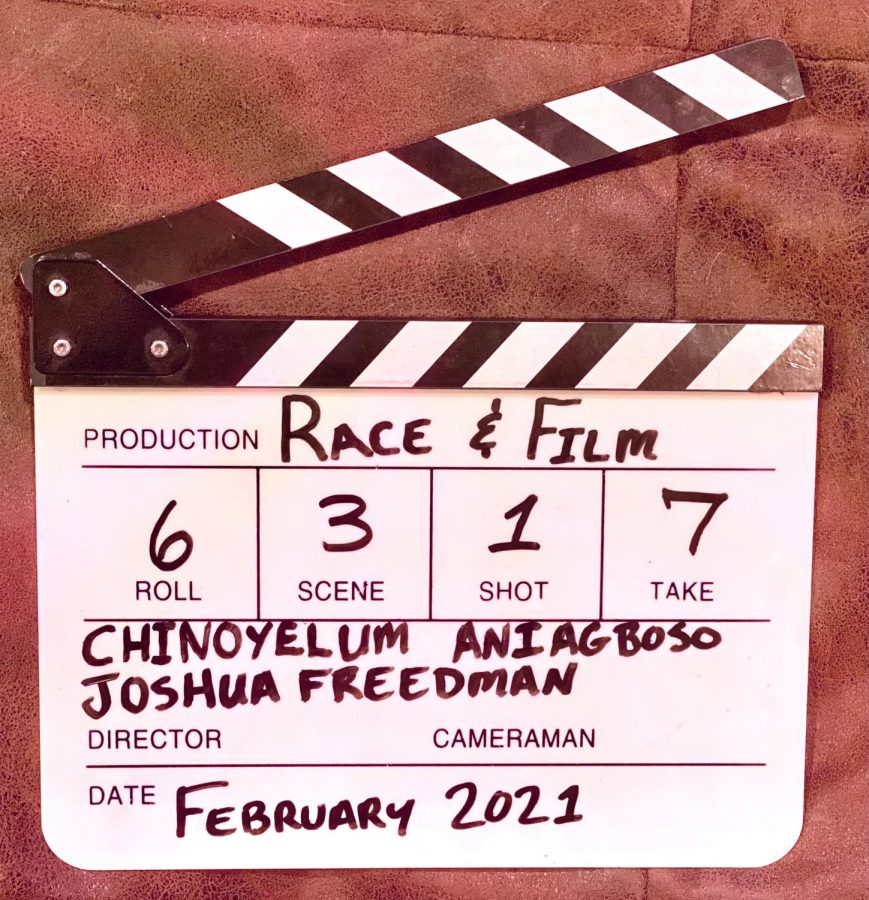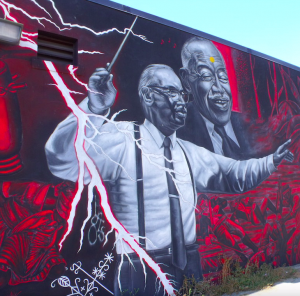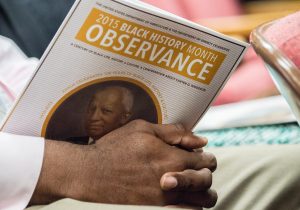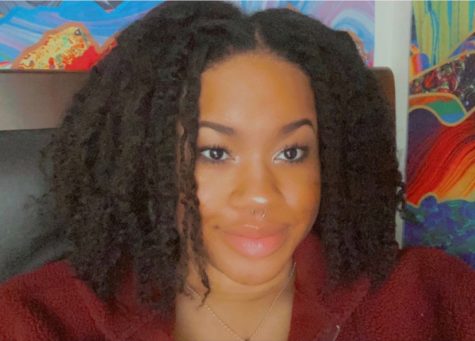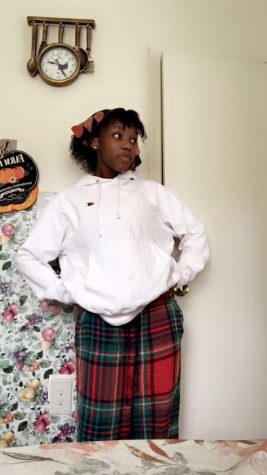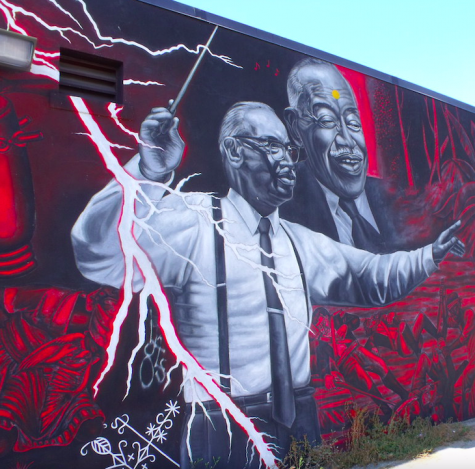From Blackface to Black Panther: How the film industry has changed its portrayal of Black people over time
Black History Month is a good time to explore the history and portrayal of Black roles in American film.
Although some could argue that the film industry as a whole has greatly progressed with regard to including Black actors in movies and sharing Black stories in a respectful and entertaining way, it is impossible to forget the plethora of films in which Black individuals are deliberately portrayed as unintelligent, inferior and oftentimes criminal.
The first recorded account of Blackface, the process by which a white person uses makeup to darken their face in order to appear as a race they do not belong to in order to belittle it, dates back to 1830 when the character Jim Crow was created. From there, Blackface grew in popularity amongst white racists, and Blackface soon dominated public entertainment.
In 1915, “The Birth of a Nation,” a film that glorified the Ku Klux Klan, was the first major motion picture to portray characters in Blackface. Keeping in mind that the Jim Crow laws were not abolished by the federal government until some 49 years later, “The Birth of a Nation” actually became the first movie ever shown in the White House when President Woodrow Wilson screened it for his staff and colleagues.
Despite the National Association for the Advancement of Colored People (founded in 1909) publicly criticizing the film, their views were largely silenced by the majority of white Americans who viewed the movie as a cinematic masterpiece. “The Birth of a Nation” set the precedent for other films that followed to have white actors portraying African Americans through the use of Blackface.
Starting in 1927, Black actors started to receive the roles of side characters in films. However, the characters they portrayed were often dumb and foolish stereotypes and provided comic relief as a side note to the central white actors.
As the years progressed, Black individuals’ portrayals in film began to increase. In the late 1970s and into the early ‘80s, Black actors began to play characters that were not diminishing, but rather strong leads that told their stories through respectful and educational lenses.
However, the stories being told were almost always about the hardships African Americans faced, which, while not inherently racist, was still limiting to the type of stories Black actors could take part in. These films, referred to as belonging to a Blaxploitation genre, were still restrictive and not yet on par with the films portraying white actors.
In a large attempt by Hollywood to take on social issues such as race, the film industry has taken significant steps in order to increase Black representation in film. For example, Jordan Peele, a biracial comedian, actor and director, became the topic of discussion after his film “Get Out” was released in 2017.
Not only did “Get Out” provide audiences with an outstanding and original script, it also brought the topic of race to the forefront by having the lead role portrayed by a strong, likeable Black actor, in sharp contrast to the white characters who appear as cruel villains and cold-hearted individuals.
Perhaps the greatest film that portrays Black individuals in an amazingly epic and positive way, is Marvel Studios’ 2018 movie, “Black Panther.” Looking back, it is surreal to see how a society can go from portraying African Americans as uneducated brutes to world leaders in medicine, technology, politics and science.
While there is still work that needs to be done to promote inclusion and diversity in the film industry (such as changing the fact that only 15.7% of the actors and actresses in major films were African American in 2019), it is clear that it has already begun to take this path, and will hopefully one day reach this goal.
Common Sense interviewed Chinoyelum Aniagboso, a member of the Black Student Union, about her views on this topic.
Q: It is no secret that Hollywood has a history of negatively portraying Black individuals in films. Do you believe it has made the proper steps toward celebrating race rather than belittling it in recent years?
A: No, I don’t believe it has made the proper steps because the way they are portrayed isn’t how it always is in reality. This is based off of stereotypes about ideas of African Americans.
Q: Have you ever discussed how your race has been portrayed in films with your family and/or friends, and what are some of the ideas you discuss?
A: I do discuss it with my friends sometimes. In some films, they make African Americans the antagonist or the bad guy or criminal, which always leads to these stereotypes. Before Black people wouldn’t have lead roles in movies, they would always be part of the ensemble, but [that] has changed over the years. Now there are films to highlight the struggles and successes of African Americans.
Q: How, if at all, has your view on how Black individuals are represented in films changed as you have grown up?
A: Yes, nowadays there is more diversity in these films and television shows. Most of [the] time they have the lead role.
Q: Is there a film that you believe celebrates your race that you would encourage others to see?
A: For Colored Girls (2010)
Q: What about this movie influenced you to answer the previous question affirmatively?
A: This movie highlighted some part of the lives and struggles of Black women.
Q: Is there a specific time you were watching a movie and felt that your race was being misrepresented and/or mocked?
A: Not really. [For Colored Girls] is just one aspect of the struggles of Black women. I feel like people should know people have different struggles and challenges based on their backgrounds and where they grew up.
Q: While watching films with Black actors, do you ever look for/pick up on stereotypes?
A: Not really. Sometimes I catch a few but I just ignore them.
Q: Do you believe that films you have watched with Black characters have influenced how you view your own race, and if yes, how so?
A: [They] influence my views in positive ways. Even [though] the films could be fictional, they still send messages. Sometimes they are motivational: seeing someone who looks like you accomplish something big through hard work and struggle.
Q: What are some of the biggest changes that you believe filmmakers can make to eliminate stereotypes of Black people in their movies?
A: I think filmmakers should try to put their feet in the shoes of African Americans and really make an attempt to understand where we come from. They need to get the real truth instead of using these stereotypes. For example, they need to stop making Black people the loudest characters or the ones to be taken less seriously in movies.
Q: With regard to promoting diversity and celebrating race, what is one thing you would like to see more of in films?
A: I want to see more of the stories of other minorities.
Q: What is one thing you would like to share with others who may not be able to differentiate stereotypes from reality with regard to Black characters in films?
A: You shouldn’t believe everything that you see in these Hollywood films. Not every African American fits into these stereotypes. This is what I would tell them to keep in mind while watching these films. And also, try to put yourself in other peoples’ positions.
Your donation will support the student journalists of Thomas S. Wootton High School. Your contribution will allow us to purchase equipment and cover our annual website hosting costs.


